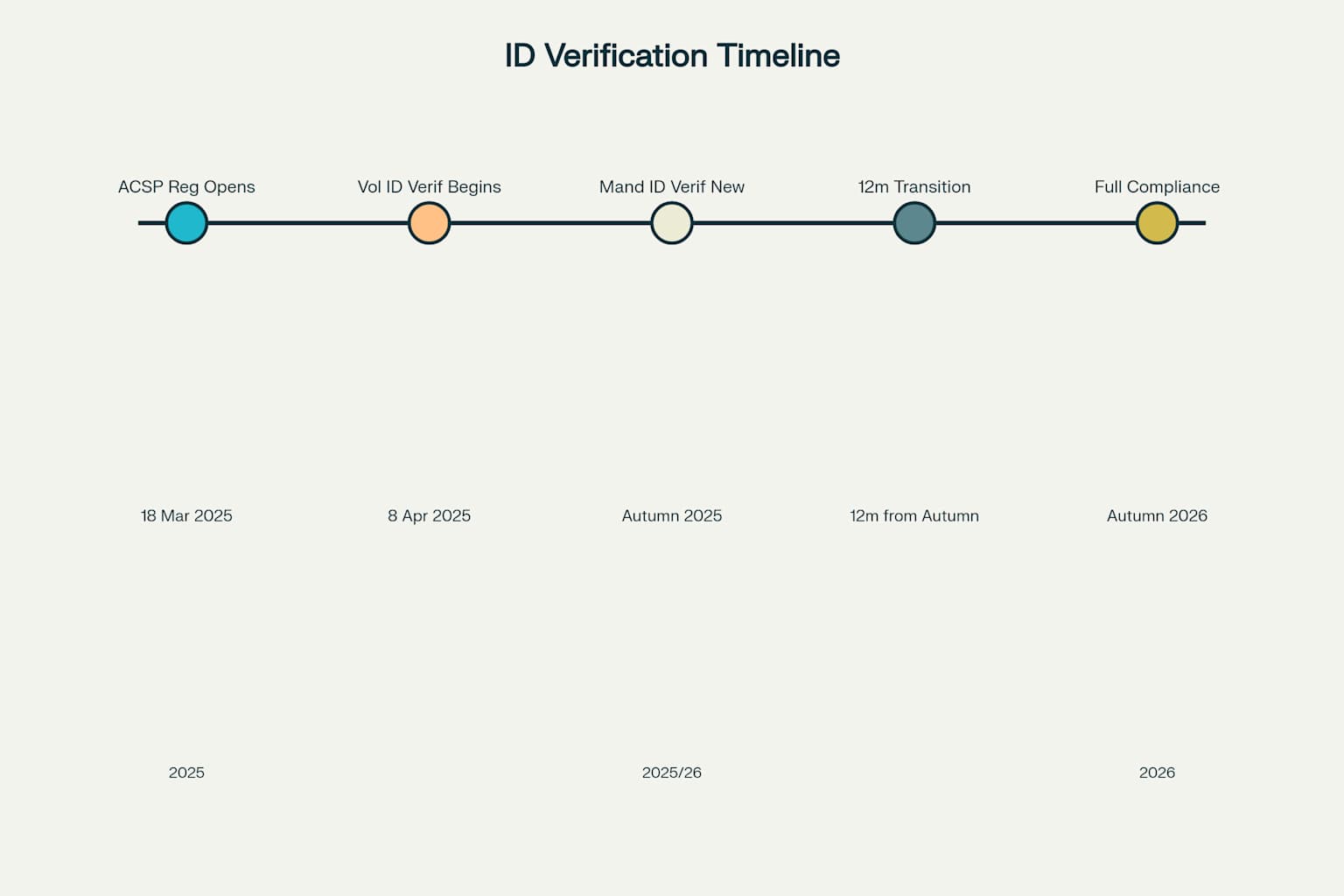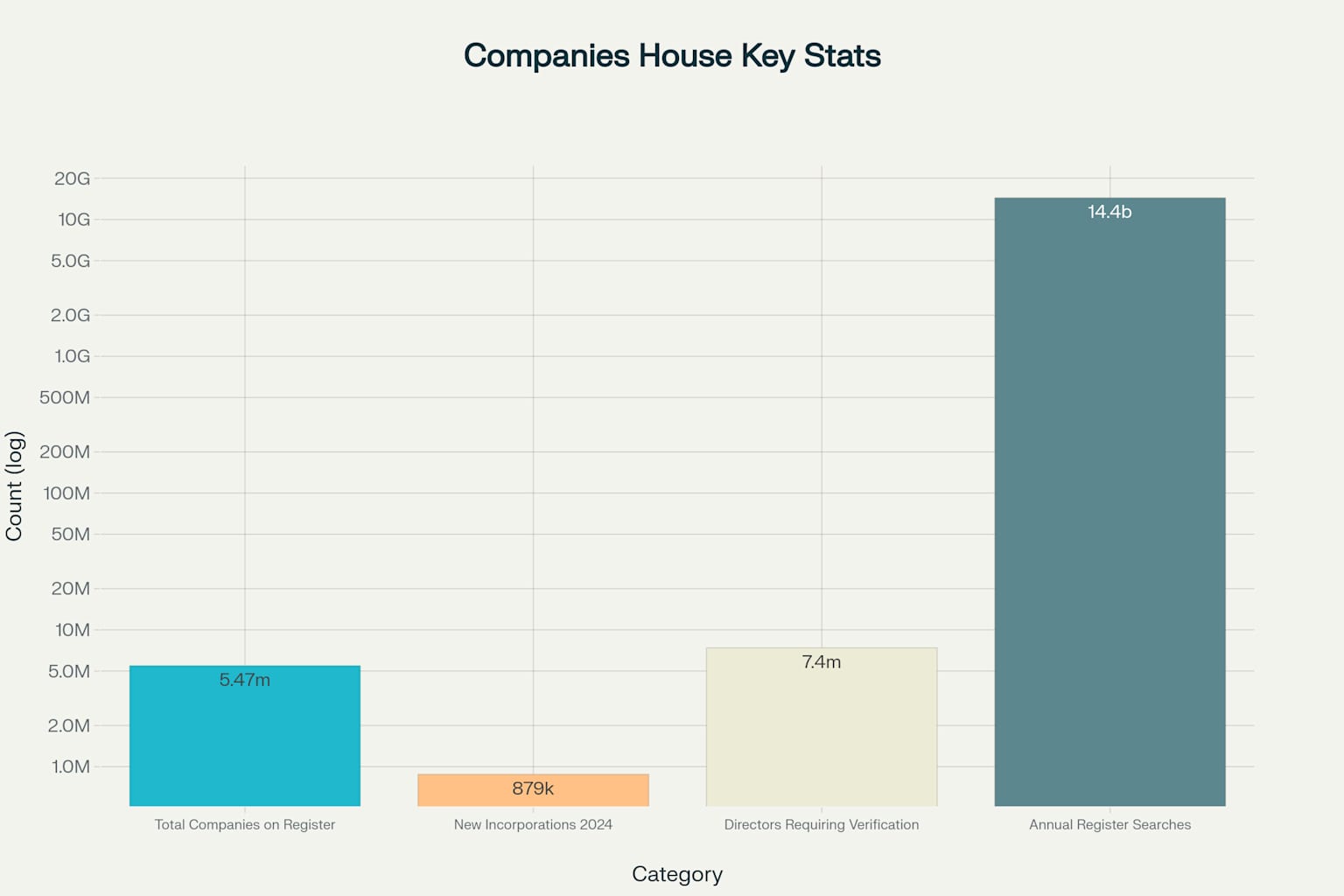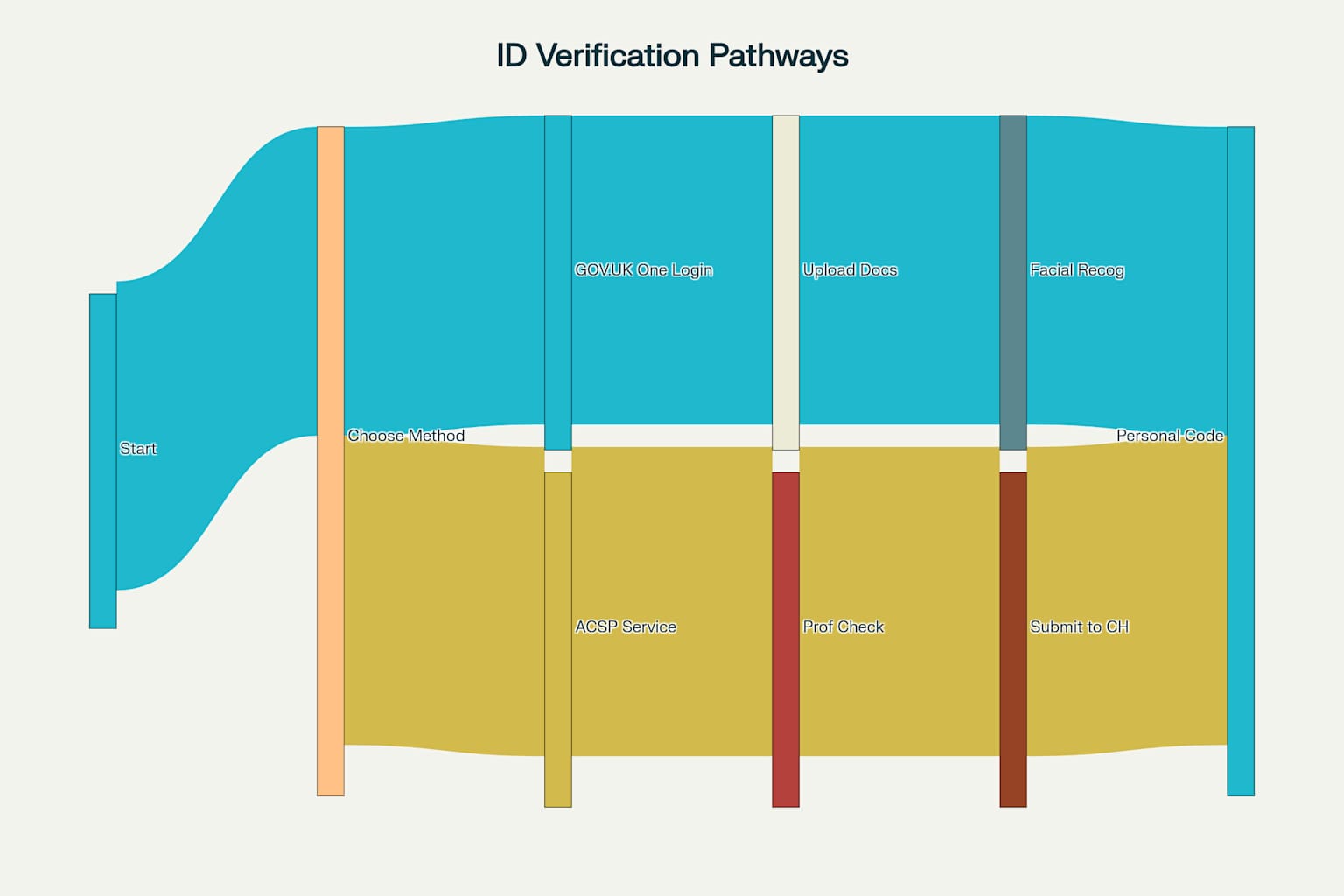The UK’s business landscape is undergoing its biggest transformation in decades, with new identity verification requirements reshaping how companies operate. Under the Economic Crime and Corporate Transparency Act 2023, every company director and Person with Significant Control (PSC) must now verify their identity with Companies House. This isn’t just another administrative hurdle—it’s a fundamental shift designed to combat the £1.17 billion fraud epidemic that hit Britain in 2024.
If you’re a director or PSC, these changes will directly impact how you run your business, file documents, and maintain compliance. The voluntary verification period began on 8 April 2025, but mandatory compliance is fast approaching. Understanding these requirements now will save you significant headaches later.

Understanding the New Identity Verification Requirements
Who Needs to Verify Their Identity?
The new rules apply to a broader range of individuals than many business owners realise. You’ll need to verify your identity if you are:
- A company director or equivalent role (including members, general partners, and managing officers)
- A Person with Significant Control (PSC) who owns or controls 25% or more of a company
- Anyone filing documents with Companies House on behalf of a company
- An Authorised Corporate Service Provider (ACSP) acting as a Companies House agent
This affects approximately 7.4 million existing officers currently listed on the Companies House register. With 879,000 new company incorporations in 2024 alone, the scale of this requirement is unprecedented.

Timeline for Implementation
The identity verification roll-out follows a carefully planned schedule designed to minimise disruption to businesses. Here’s what you need to know about each phase:
- Phase 1: ACSP Registration (18 March 2025): Third-party service providers like accountants and solicitors could begin registering as Authorised Corporate Service Providers. This allows them to verify client identities on behalf of Companies House.
- Phase 2: Voluntary Verification (8 April 2025): Directors and PSCs can now voluntarily verify their identities. Early adoption helps avoid the rush when verification becomes mandatory.
- Phase 3: Mandatory Verification (Autumn 2025): Identity verification becomes compulsory for all new director appointments and company incorporation. New directors must verify within 14 days of appointment.
- Phase 4: Transition Period (12 months from Autumn 2025): Existing directors and PSCs must verify their identities, with verification integrated into the annual confirmation statement process.
- Phase 5: Full Compliance (Autumn 2026): All individuals must have completed identity verification or face enforcement action.
Why These Changes Are Necessary
The UK has emerged as a global hotspot for corporate fraud, with criminals exploiting the previously passive nature of the Companies House register. Louise Smyth, CEO of Companies House, explained: “At the moment, we accept information to the register without checking that people are who they say they are”. This has led to serious problems:
- Criminals falsely claiming to be directors of UK companies
- False information being filed on the public register
- Identity theft affecting legitimate business owners
- Fraudulent use of company structures for illegal activities
The new verification system addresses these issues by ensuring that only verified individuals can act as directors or PSCs.
Read More: A Comprehensive Guide to the Non-Resident Landlord Scheme
How to Verify Your Identity: A Step-by-Step Guide
Method 1: Direct Verification Through GOV.UK One Logine
The most straightforward approach is verifying directly with Companies House using GOV.UK One Login. This method is free and available to anyone with suitable identification documents.
Required Documents:
- Bio-metric passport from any country
- UK photo driving licence (full or provisional)
- UK bio-metric residence permit (BRP)
- UK bio-metric residence card (BRC)
- UK Frontier Worker permit (FWP)
Step-by-Step Process:
- Prepare Your Documents: Ensure your chosen ID document is current and valid. The details on your document must match the information held on the Companies House register.
- Access GOV.UK One Login: Visit the “Verify your identity for Companies House” service. You’ll need to create a GOV.UK One Login account if you don’t already have one.
- Upload Your Documents: Take clear photographs or scans of your identity document. The system uses advanced document verification technology to check authenticity.
- Complete Facial Recognition: Take a live selfie using your phone or computer camera. This matches your face to the photograph on your identity document.
- Receive Your Personal Code: Once verification is complete, you’ll receive a unique Companies House personal code. This code is personal to you, not your company.
Alternative Options for UK Residents:
If you don’t have suitable photo ID but live in the UK, you may be able to verify using:
- Bank or building society details with your National Insurance number
- In-person verification at selected Post Office locations

Method 2: Verification Through an ACSP
If you cannot verify directly or prefer professional assistance, you can use an Authorised Corporate Service Provider. This includes accountants, solicitors, company formation agents, and other regulated professionals.
Benefits of Using an ACSP:
- Professional guidance through the process
- Suitable for complex international situations
- Helpful for directors without suitable digital ID
- Can handle verification for multiple company officers
ACSP Requirements:
ACSPs must be registered with an Anti-Money Laundering supervisory body and complete their own identity verification. They charge a fee for their services, typically ranging from £50-£200 depending on complexity.
What ACSPs Must Check:
- Your full name and any former names
- Date of birth
- Current home address
- Address history for the last 12 months
- Email address
ACSPs must retain records of identity checks for seven years. They can complete checks remotely or in person.
Your Companies House Personal Code: What You Need to Know
Understanding Your Personal Code
Your Companies House personal code is a unique identifier that proves you’ve completed identity verification. Think of it like a digital passport for your business activities. This code is:
- Personal to you as an individual, not your company
- Required for all future filings and appointments
- Confidential and should be kept secure
- Valid across all your director and PSC roles
How to Use Your Personal Code
From autumn 2025, you’ll need your personal code for various business activities:
- Filing confirmation statements
- Accepting new director appointments
- Registering as a PSC
- Making any filings with Companies House
Important: You must share your personal code with anyone who files documents on your behalf, such as your accountant or company secretary. Keep this information as secure as you would your UTR number or other sensitive business codes.
Linking Your Code to Existing Roles
If you’re already a director or PSC, you’ll need to link your verified identity to your existing appointments. This is a legal requirement that ensures Companies House knows the correct identity is connected to your roles.
Common Challenges and How to Overcome Them
Document Mismatch Issues
One of the most common problems occurs when personal information on your identity documents doesn’t match the details held on the Companies House register. This prevents successful verification.
Solution:
- Check your company’s details on the Companies House register
- Update incorrect information before attempting verification
- For complex changes, you may need to file paper forms
Technical Difficulties
Some users experience technical issues with the online verification process. Common problems include:
- Server busy messages during peak times
- Document upload failures
- Facial recognition not working properly
Solutions:
- Try verification during off-peak hours
- Ensure your device meets system requirements
- Contact Companies House if problems persist
International Directors
Directors based outside the UK may face additional challenges. The process may take longer, especially if using an ACSP.
Recommendations:
- Start the verification process early
- Consider using an ACSP familiar with international requirements
- Allow extra time for document verification
Consequences of Non-Compliance
Immediate Restrictions
If you fail to verify your identity by the required deadlines, you’ll face several immediate consequences:
- Unable to file confirmation statements
- Cannot make any other filings with Companies House
- Prohibited from starting new companies
- Cannot accept new director appointments
Financial Penalties
Non-compliance constitutes a criminal offence under the Economic Crime and Corporate Transparency Act 2023. Penalties include:
- Fixed fines ranging from £250 to £2,000
- Daily penalties for continuing offences
- Potential criminal prosecution in serious cases
Enforcement Action
Companies House has adopted a “holistic approach to enforcement,” sharing intelligence with other agencies. This could trigger:
- Deeper investigations into your business affairs
- Director disqualification proceedings
- Referral to other enforcement bodies
Preparing Your Business for Compliance
Immediate Actions Required
For Directors:
- Check your details on the Companies House register
- Gather required identity documents
- Complete verification during the voluntary period
- Securely store your personal code
- Share your code with trusted service providers
For Companies with Multiple Directors:
- Ensure all directors understand the requirements
- Allow plenty of time for each person to verify
- Keep records of who has completed verification
- Update your confirmation statement filing process
Integration with Confirmation Statements
From autumn 2025, identity verification will be integrated with the confirmation statement process. This means:
- Directors must include their personal codes when filing
- Unverified directors cannot be listed on confirmation statements
- Late verification could delay your annual filings
Working with Professional Advisers
If you use accountants or other professional services, ensure they understand the new requirements. They’ll need your personal codes to file documents on your behalf.
Questions to Ask Your Adviser:
- Are they registered as an ACSP?
- Do they understand the new verification requirements?
- How will they handle your personal codes securely?
- What’s their process for managing multiple client verification’s?
The Broader Impact on UK Business
Statistical Overview
The scale of these changes is unprecedented in UK corporate law. Consider these key statistics:
- Over 5.47 million companies on the register
- 7.4 million directors and PSCs requiring verification
- 14.4 billion annual searches of the Companies House register
- £15.4 billion annual business compliance costs across all regulations
Long-term Benefits
While the immediate impact involves additional administrative burden, the long-term benefits are significant:
Enhanced Security
- Reduced corporate fraud and identity theft
- Improved confidence in UK business register
- Better protection for legitimate business owners
Economic Benefits
- Strengthened UK reputation as a trusted business jurisdiction
- Reduced costs associated with fraudulent company activities
- Better quality data for business decision-making
Regulatory Improvements
- More effective enforcement of company law
- Enhanced ability to detect and prevent economic crime
- Better coordination between regulatory agencies
Frequently Asked Questions
When must I complete verification?
The deadline depends on your situation:
- New directors: Within 14 days of appointment (from autumn 2025)
- Existing directors: During your confirmation statement filing (from autumn 2025)
- PSCs: Within 14 days of becoming registrable
Can I Verify on Behalf of Others?
No, identity verification is personal and cannot be completed by someone else. Each individual must verify their own identity.
What If I’m Director of Multiple Companies?
You only need to verify your identity once. Your personal code works across all your director and PSC roles.
How Long Does Verification Take?
- Direct verification: Usually 24-48 hours
- ACSP verification: Depends on the provider
- Post Office verification: Varies by location
What If My Documents Are Rejected?
Check that your document details match the Companies House register. If problems persist, contact Companies House directly or consider using an ACSP.
Conclusion
The new Companies House identity verification requirements represent a fundamental shift in UK corporate governance. While the changes require immediate attention and may seem complex, they’re designed to protect legitimate businesses and enhance trust in the UK business environment.
The key to successful compliance is early action. Don’t wait until verification becomes mandatory—start the process now during the voluntary period. This gives you time to resolve any technical issues and ensures you’re ready when the requirements become compulsory.
Remember that verification is a one-time process that will streamline your future interactions with Companies House. Your personal code becomes your digital identity for all business activities, making future filings more secure and efficient.
The UK’s commitment to combating economic crime through these measures positions it as a leader in corporate transparency. By embracing these changes now, you’re not just meeting legal requirements—you’re contributing to a more trustworthy and secure business environment for everyone.
For ongoing updates and detailed guidance, regularly check the Companies House website and consider subscribing to their email newsletters. The landscape of UK corporate law continues to evolve, and staying informed is crucial for maintaining compliance and protecting your business interests.



